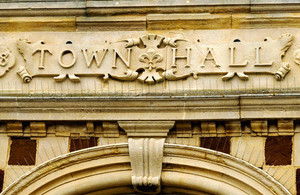New democratic checks to help keep Council Tax down
Councillors’ votes to be made a matter of public record.

A new public record of how councillors vote on their budget, including Council Tax, will further protect hard-working families, Local Government Secretary Eric Pickles announced today (4 February 2014).
New regulations put before Parliament today will require councils to publish, as a matter of record, how each councillor votes on any budget decisions including Council Tax changes. Previously, individual voting records were not usually public with only the overall vote outcome published.
This new development increases council transparency and accountability over Council Tax. It is the latest step in a series of measures the government has taken to help address the cost of living for hard-working families.
This government has worked with local authorities to freeze Council Tax for the last 3 years, cutting average bills by 10% in real terms.
A fourth freeze could be worth up to £718 for the average bill payer with more savings to come next year. The government has offered councils up to £550 million to freeze Council Tax for the next 2 years.
In addition the government has put in place democratic checks, through the Localism Act, to prevent big rises by allowing local people to veto tax hikes through a local referendum.
The government will be publishing shortly the final local government finance settlement, and then the House of Commons will vote on the threshold at which a local referendum will be required for 2014.
Local Government Secretary Eric Pickles said:
Much like an MP, how a councillor votes should be a matter of public record so the electorate can see each decision has their best interests at heart.
The changes we have introduced today will strengthen the local accountability around Council Tax. With voting decisions openly recorded and local referendums for excessive increases, Council Tax bills will no longer dodge local democracy.
In addition, this government is helping hard-working families manage their cost of living by funding those town halls willing to freeze Council Tax bills in stark contrast to before 2010 when bills more than doubled.
Further information
Residents are also now able to pay their Council Tax bills over 12 months rather than 10 to spread the cost of bills and help with the cost of living while the government has also announced plans to remove an unfair Council Tax surcharge on family annexes and home improvements, to help support extended families.
Ministers in December 2013 said they were open to representations on whether a lower threshold should be applied to all or some categories of local authorities, given the strong need to protect taxpayers wherever possible from unreasonable increases in Council Tax bills.
Local referendums could be held this year on the same day as the European elections at minimal cost and inconvenience.
Office address and general enquiries
2 Marsham StreetLondon
SW1P 4DF
Contact form https://www.gov.uk/gui...
General enquiries: please use this number if you are a member of the public 030 3444 0000
If your enquiry is related to COVID-19 please check our guidance page first before you contact us - https://www.gov.uk/guidance/coronavirus-covid-19-guidance-for-local-government.
If you still need to contact us please use the contact form above to get in touch, because of coronavirus (COVID-19). If you send it by post it will not receive a reply within normal timescale.
Media enquiries
Email newsdesk@communities.gov.uk
Please use this number if you are a journalist wishing to speak to Press Office 0303 444 1209